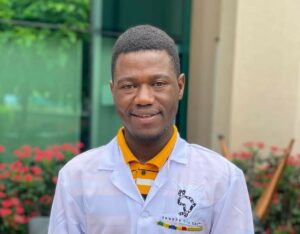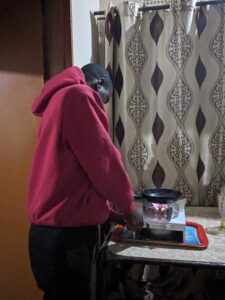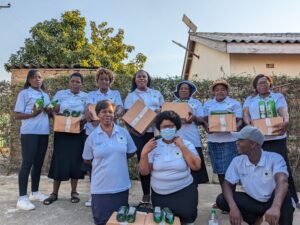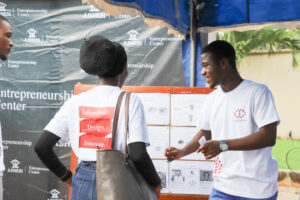We’re excited to feature Leeroy Magora in our final Fellow Q+A of 2023! Leeroy won a Resolution Fellowship with his venture, KubikaNice, (“Kubika” means “cooking” in Shona the local language in Zimbabwe) at the 2023 Returning Finalist Social Venture Challenge. We had a chance to catch up with Leeroy and ask him about what it takes to be a social entrepreneur and run his social venture.
 Please briefly introduce yourself.
Please briefly introduce yourself.
Hello, I’m Leeroy, an Electrical and Electronics Engineering student at Ashesi University College [in Berekuso, Ghana] and a passionate advocate for social change. Growing up in the Tsanzaguru peri-urban community in Zimbabwe, I witnessed the challenges caused by cooking energy shortages, deforestation, and indoor air pollution. This experience fueled my commitment to finding sustainable solutions. I co-founded the Bio-Answer Initiative, now called KubikaNice, which won the 2022 Africa Business Concept Challenge.
What would you like people to know about you outside of your venture work? This can include your personal experiences, hobbies, or interests.
During my spare time, I enjoy listening to music, and my favorite genre is reggae music, with Lucky Dube being my all-time favorite artist, at least for now. I used to be a big movie fan but, during the last two years, that kind of changed. More professionally, I am also beginning to enjoy data analytics.
Please briefly introduce your venture and why you were inspired to create it.
 KubikaNice produces clean, affordable, bioethanol from abundant local corn stover (stalks, leaves, and cobs that remain in fields after the corn harvest) for cooking in Tsanzaguru peri-urban community. Growing up in the Tsanzaguru peri-urban community in Zimbabwe, my aunt’s switch to firewood for cooking due to electricity shortages—our primary source of cooking fuel—profoundly impacted me. It took a lot of work to gather enough firewood, often requiring us to travel long distances of over 5km to distant hills during weekends. Witnessing forests shrinking in our community was devastating. As I grew up, I was determined to work towards alleviating this pain. This eventually gave birth to KubikaNice when I met a Kenyan friend who first introduced me to bioethanol cooking in Kenya.
KubikaNice produces clean, affordable, bioethanol from abundant local corn stover (stalks, leaves, and cobs that remain in fields after the corn harvest) for cooking in Tsanzaguru peri-urban community. Growing up in the Tsanzaguru peri-urban community in Zimbabwe, my aunt’s switch to firewood for cooking due to electricity shortages—our primary source of cooking fuel—profoundly impacted me. It took a lot of work to gather enough firewood, often requiring us to travel long distances of over 5km to distant hills during weekends. Witnessing forests shrinking in our community was devastating. As I grew up, I was determined to work towards alleviating this pain. This eventually gave birth to KubikaNice when I met a Kenyan friend who first introduced me to bioethanol cooking in Kenya.
What do you wish more people knew about bioethanol production and clean cooking?
Bioethanol production isn’t just environmentally friendly—it’s also remarkably affordable. With innovative approaches like using local resources, particularly corn stover, we can create a clean cooking fuel that’s sustainable and accessible to a broader population. Affordability is a crucial aspect that makes bioethanol a practical and impactful solution to the cooking energy crisis, ensuring that cleaner, healthier cooking is within reach for communities in need.
What led you to Resolution Project?
My desire to make a lasting impact on communities like mine led me to Resolution Project. The opportunity to become a Resolution Fellow aligns with my goal of leveraging technology and innovation to address social challenges, such as the energy crisis in Zimbabwe. I believe that Resolution Project’s support ecosystem, including mentorship and seed funding, will be instrumental in bringing KubikaNice (our clean cooking fuel venture) to fruition and positively impacting lives in Zimbabwe.
What excites you most about the Resolution Fellowship? How has the Resolution Fellowship impacted you directly and your venture?
The Resolution Fellowship has been a transformative experience, providing unparalleled support to me personally and to KubikaNice. The funding from Resolution enabled us to pilot our bioethanol cooking solution successfully with 10 households, validating our assumptions and marking a significant achievement. Beyond financial support, Resolution Project has consistently been there, fostering an environment that allows us to explore and refine our venture while offering unwavering support. The guidance from Resolution Guides during monthly interactions has been invaluable, offering holistic insights. The flexibility and encouragement from Resolution have empowered us to navigate the entrepreneurial journey with confidence, turning our vision into a tangible, impactful reality.
Can you tell us how your venture has directly impacted those you aim to serve? How has Resolution contributed to this impact?
Through the financial support we got from Resolution, we have gathered valuable insights from the Tsanzaguru community. Through close engagement and strategic partnerships with MotoSafi, and ZERA, we successfully distributed 10 ethanol cookstoves and 100 liters of bioethanol for the pilot. The feedback from our questionnaire revealed key considerations:
- Efficiency: We noted that participants found similar cooking times for gas, electricity, and ethanol, emphasizing the efficiency of our ethanol cookstove.
- Affordability: Participants expressed price sensitivity, indicating a willingness to pay $10 for the stove and $1 for 1 liter of ethanol. This underscores the importance of affordability in driving adoption.
- Usage Preference: Affordability emerged as a significant factor, with participants expressing a preference for ethanol over LPG if it offers cost advantages.
- Ethanol Quantity: Insights on anticipated ethanol consumption (10 liters per month) were gathered, providing valuable information for production planning.
- Prototype Observations: Users found our stove operation intuitive, praising flame intensity and switch quality. However, recommendations included the need for larger stove models and a more durable stand for family-sized meals.
- General Feedback: Affordability and availability of ethanol were highlighted as critical factors for successful adoption as a clean cooking fuel alternative.
These insights are crucial for enhancing our impact and scalability at KubikaNice. The ongoing support and guidance from the Resolution Fellowship have played a vital role, providing us with the resources needed to pilot and refine our approach.

How has consumer feedback shaped the way you’re moving forward with more support from Resolution Project?
We are refining our products based on user suggestions, diversifying stove options, reassessing pricing for affordability, enhancing education and awareness initiatives, and optimizing production planning. The Resolution Fellowship’s continued guidance and resources are instrumental in aligning our approach with community needs, ensuring KubikaNice evolves to provide effective and sustainable clean cooking solutions.
What do you think is preventing more young people like you from launching their own venture?
For most developing countries like Zimbabwe, it’s a broad lack of access to funding and barriers to entry for startups as there are no support systems in place to support startups in terms of policy.
What advice would you give to other young leaders who are looking to start their first social venture?
I encourage them to pursue the cause despite it even looking scary. It may not be easy, but it’s worth the effort.
How can the Resolution Project community keep up to date with your work?
